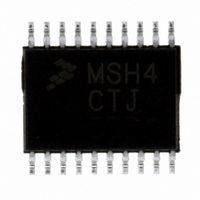MC9S08SH4CTJ Freescale Semiconductor, MC9S08SH4CTJ Datasheet - Page 176

MC9S08SH4CTJ
Manufacturer Part Number
MC9S08SH4CTJ
Description
IC MCU 8BIT 4K FLASH 20-TSSOP
Manufacturer
Freescale Semiconductor
Series
HCS08r
Datasheet
1.MC9S08SH4CTJ.pdf
(338 pages)
Specifications of MC9S08SH4CTJ
Core Processor
HCS08
Core Size
8-Bit
Speed
40MHz
Connectivity
I²C, LIN, SCI, SPI
Peripherals
LVD, POR, PWM, WDT
Number Of I /o
17
Program Memory Size
4KB (4K x 8)
Program Memory Type
FLASH
Ram Size
256 x 8
Voltage - Supply (vcc/vdd)
2.7 V ~ 5.5 V
Data Converters
A/D 12x10b
Oscillator Type
Internal
Operating Temperature
-40°C ~ 85°C
Package / Case
20-TSSOP
Processor Series
S08SH
Core
HCS08
Data Bus Width
8 bit
Data Ram Size
256 B
Interface Type
SCI/SPI
Maximum Clock Frequency
40 MHz
Number Of Programmable I/os
17
Number Of Timers
3
Operating Supply Voltage
2.7 V to 5.5 V
Maximum Operating Temperature
+ 85 C
Mounting Style
SMD/SMT
3rd Party Development Tools
EWS08
Development Tools By Supplier
DEMO9S08SG32, DEMO9S08SG32AUTO, DEMO9S08SG8, DEMO9S08SG8AUTO, DEMO9S08SH32, DEMO9S08SH8
Minimum Operating Temperature
- 40 C
On-chip Adc
12-ch x 10-bit
A/d Bit Size
10 bit
A/d Channels Available
12
Height
1.05 mm
Length
6.6 mm
Supply Voltage (max)
5.5 V
Supply Voltage (min)
2.7 V
Width
4.5 mm
Lead Free Status / RoHS Status
Lead free / RoHS Compliant
Eeprom Size
-
Lead Free Status / Rohs Status
Lead free / RoHS Compliant
Available stocks
Company
Part Number
Manufacturer
Quantity
Price
Part Number:
MC9S08SH4CTJR
Manufacturer:
FREESCALE
Quantity:
20 000
- Current page: 176 of 338
- Download datasheet (4Mb)
Chapter 11 Inter-Integrated Circuit (S08IICV2)
the transition from master to slave mode does not generate a stop condition. Meanwhile, a status bit is set
by hardware to indicate loss of arbitration.
11.4.1.7
Because wire-AND logic is performed on the SCL line, a high-to-low transition on the SCL line affects all
the devices connected on the bus. The devices start counting their low period and after a device’s clock has
gone low, it holds the SCL line low until the clock high state is reached. However, the change of low to
high in this device clock may not change the state of the SCL line if another device clock is still within its
low period. Therefore, synchronized clock SCL is held low by the device with the longest low period.
Devices with shorter low periods enter a high wait state during this time (see
devices concerned have counted off their low period, the synchronized clock SCL line is released and
pulled high. There is then no difference between the device clocks and the state of the SCL line and all the
devices start counting their high periods. The first device to complete its high period pulls the SCL line
low again.
11.4.1.8
The clock synchronization mechanism can be used as a handshake in data transfer. Slave devices may hold
the SCL low after completion of one byte transfer (9 bits). In such a case, it halts the bus clock and forces
the master clock into wait states until the slave releases the SCL line.
11.4.1.9
The clock synchronization mechanism can be used by slaves to slow down the bit rate of a transfer. After
the master has driven SCL low the slave can drive SCL low for the required period and then release it. If
the slave SCL low period is greater than the master SCL low period then the resulting SCL bus signal low
period is stretched.
176
SCL1
SCL2
SCL
Clock Synchronization
Handshaking
Clock Stretching
Internal Counter Reset
Figure 11-10. IIC Clock Synchronization
MC9S08SH8 MCU Series Data Sheet, Rev. 3
Delay
Start Counting High Period
Figure
Freescale Semiconductor
11-10). When all
Related parts for MC9S08SH4CTJ
Image
Part Number
Description
Manufacturer
Datasheet
Request
R
Part Number:
Description:
Manufacturer:
Freescale Semiconductor, Inc
Datasheet:
Part Number:
Description:
Manufacturer:
Freescale Semiconductor, Inc
Datasheet:
Part Number:
Description:
Manufacturer:
Freescale Semiconductor, Inc
Datasheet:
Part Number:
Description:
Manufacturer:
Freescale Semiconductor, Inc
Datasheet:
Part Number:
Description:
Manufacturer:
Freescale Semiconductor, Inc
Datasheet:
Part Number:
Description:
Manufacturer:
Freescale Semiconductor, Inc
Datasheet:
Part Number:
Description:
Manufacturer:
Freescale Semiconductor, Inc
Datasheet:
Part Number:
Description:
Manufacturer:
Freescale Semiconductor, Inc
Datasheet:
Part Number:
Description:
Manufacturer:
Freescale Semiconductor, Inc
Datasheet:
Part Number:
Description:
Manufacturer:
Freescale Semiconductor, Inc
Datasheet:
Part Number:
Description:
Manufacturer:
Freescale Semiconductor, Inc
Datasheet:
Part Number:
Description:
Manufacturer:
Freescale Semiconductor, Inc
Datasheet:
Part Number:
Description:
Manufacturer:
Freescale Semiconductor, Inc
Datasheet:
Part Number:
Description:
Manufacturer:
Freescale Semiconductor, Inc
Datasheet:
Part Number:
Description:
Manufacturer:
Freescale Semiconductor, Inc
Datasheet:











